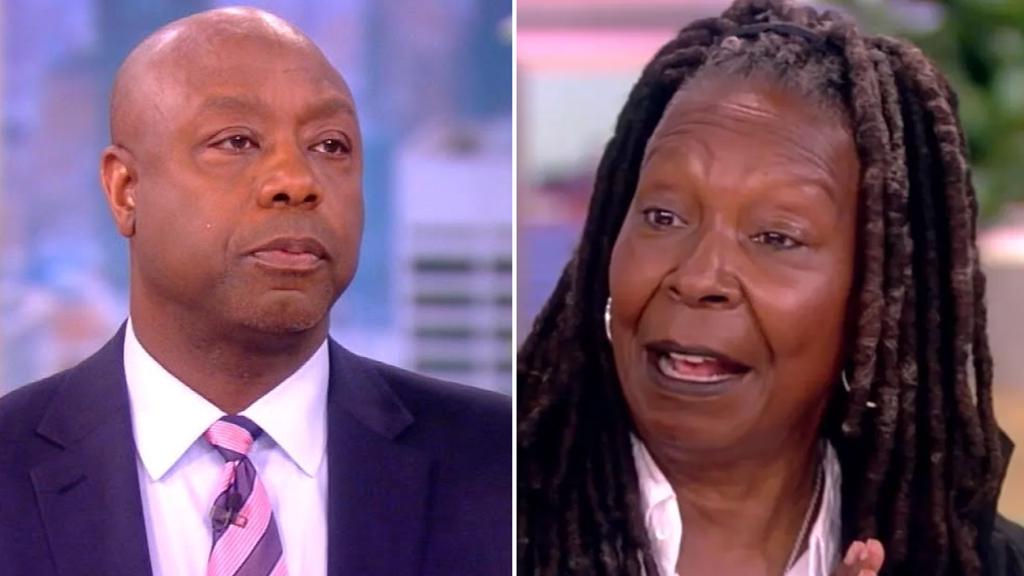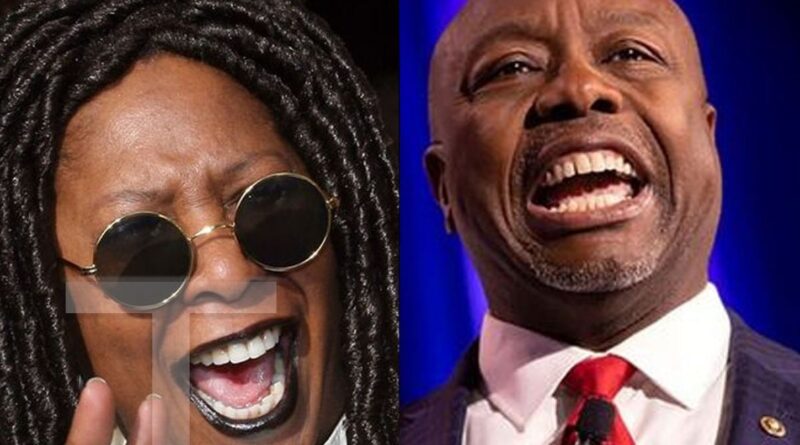Breaking News: Whoopi Goldberg Files a $15 Million Lawsuit Against Tim Scott, Accusing Him of Disrespecting Her During an On-Air Show

In a development that has left Hollywood and political circles abuzz, Whoopi Goldberg has filed a $15 million lawsuit against Senator Tim Scott, alleging that he disrespected her during an appearance on “The View.” The lawsuit, which has been filed in the Los Angeles Superior Court, claims that Scott’s conduct on the show was not only disrespectful but also damaging to Goldberg’s reputation and mental well-being.
The controversy began during an episode of “The View” when Senator Tim Scott, a prominent Republican and potential presidential candidate, appeared as a guest. The discussion, which was initially centered around bipartisan efforts in Congress, quickly became heated. According to Goldberg’s legal team, Scott made several comments that were “demeaning and dismissive” toward Goldberg, a long-time co-host of the show.
Eyewitnesses and viewers of the episode noted that the conversation took a sharp turn when Scott was questioned about his stance on various social issues, including race relations and economic inequality. Goldberg, known for her outspoken views, challenged Scott on several points, leading to a tense exchange. The lawsuit alleges that Scott’s responses were not only disrespectful but also intended to undermine Goldberg’s credibility and standing as a co-host.
The suit claims that Scott’s behavior caused Goldberg significant emotional distress. It describes the experience as “humiliating” and alleges that Goldberg has suffered from anxiety and stress as a result of the incident.
Goldberg contends that the exchange damaged her reputation both personally and professionally. The lawsuit argues that Scott’s comments were designed to discredit her in front of millions of viewers, which has led to negative press and social media backlash.
The lawsuit also includes a claim for intentional infliction of emotional distress, asserting that Scott’s actions were deliberate and intended to cause harm to Goldberg.
Goldberg’s attorney, Lisa Bloom, issued a statement on behalf of her client: “Whoopi Goldberg has dedicated her life to advocating for justice and equality. The disrespect she endured on national television was not only unprofessional but also deeply harmful. We are seeking accountability and justice for the harm caused.”
Senator Tim Scott has responded to the lawsuit, calling the allegations “baseless” and “politically motivated.” In a statement released by his office, Scott expressed his disappointment with Goldberg’s decision to pursue legal action. “I have always respected Whoopi Goldberg as a prominent figure in the entertainment industry and a vocal advocate for her beliefs. Our discussion on ‘The View’ was spirited, but at no point did I intend to disrespect her. These allegations are unfounded, and I look forward to clearing my name,” Scott said.
Scott’s legal team is expected to file a motion to dismiss the lawsuit, arguing that the exchange was within the bounds of typical political discourse and protected under the First Amendment.
The lawsuit has sparked a wide range of reactions from both the public and the media. Supporters of Goldberg have taken to social media to express their solidarity, using hashtags like #StandWithWhoopi and #RespectWhoopi. They argue that public figures, especially women and minorities, should not be subjected to disrespectful treatment on national television.
Critics of the lawsuit, however, see it as an overreaction and a potential attempt to silence political discourse. Some argue that heated exchanges are a natural part of political debates and that filing a lawsuit sets a dangerous precedent.
Legal experts are divided on the potential outcome of the lawsuit. Some believe that Goldberg may have a case if she can prove that Scott’s comments caused her significant emotional distress and damage to her reputation. Others, however, point out the challenges of proving intentional infliction of emotional distress in a political context.
Law professor Alan Dershowitz commented on the case, saying, “While public figures are entitled to protection from defamation and intentional harm, the bar for proving emotional distress is quite high. This case will hinge on whether Goldberg’s legal team can demonstrate that Scott’s comments went beyond the norms of political debate.”
The lawsuit also raises questions about the boundaries of political discourse and the responsibilities of public figures in media appearances. As political discussions become increasingly polarized, incidents like this highlight the need for respectful dialogue and the potential consequences of crossing the line.
For Goldberg and Scott, the lawsuit represents more than just a legal battle—it is a reflection of the broader cultural and political tensions in America today. As the case unfolds, it will undoubtedly be watched closely by both the entertainment industry and the political sphere.
The lawsuit filed by Whoopi Goldberg against Tim Scott is a significant development in the intersection of politics and media. It underscores the challenges public figures face in navigating contentious debates and the impact such exchanges can have on personal and professional reputations. As the legal proceedings move forward, the case will continue to generate discussion and debate, reflecting the complexities of modern political discourse.
